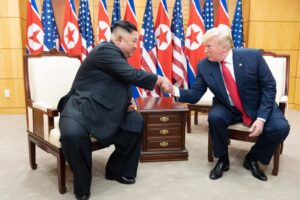Drug trafficking into the United States is no longer just a criminal act supported by cartels in Mexico and Asia. It has evolved into a strategic plan of attack, similar to the terrorist tactics commonly used to destabilize countries and governments. This “narco-terrorism” is driven solely by the desire for money and power.
Consequently, drug trafficking has become a complex multi-billion-dollar business, with global cartels constantly at odds with law enforcement. The smuggling and distribution of substances like heroin, cocaine and methamphetamines have resulted in gang violence in the U.S. and cartel conflicts, particularly in Latin America.
The U.S. government actively engaged these cartels in the past and, after much effort and hard work, has toppled famous names such as the FARC, Medellin and Cali cartels. However, this did not stop the narcotics smuggling into the United States as other cartels filled the vacuum and found more accessible smuggling routes through Mexico, where enforcement policies were almost non-existent.
Violence and death for a fist full of dollars
In the 1990s, the Gulf, Sinaloa, and Juarez cartels in Mexico ruled the trade, but the 2000s saw new cartels emerge, like the Los Zetas, which began as a private army for the Gulf cartel before branching out on its own. Others followed, all following the trend of using even more extreme violence to achieve their profit goals.
The result has seen an increase in narcotic smuggling, with the latest drug of choice being fentanyl. In 2022, fentanyl was responsible for 200 deaths in the U.S. every day. This is not simply another phase of narcotic availability; it is the deliberate weaponization of a narcotic substance that can kill with ease. The cartels are also taking more interest in controlling distribution in America through various gangs, which are now better armed and financed, and competition is fierce and savage.
Narco-terrorism is nothing new. It has a rich history soaked in blood. Colombian drug kingpin Pablo Escobar attempted to kill a single person by bombing Avianca Flight 203 on Nov. 27, 1989. This act of terror killed 110 people, including two U.S. citizens. Escobar also backed the M19 terrorists to the tune of $1 million, supporting an attack on Colombia’s Supreme Court building in Bogota in 1985, resulting in the deaths of many hostages, up to 40 dead terrorists, and the execution of 11 justices.
Again, in Colombia, FARC engaged in narco-terrorism to control the drug trafficking areas in the country. At the same time, the ‘Shining Path’, a radical Marxist-Maoist terror group, caused over 24,000 deaths in Peru in the 1980s, again funded by narcotic sales. More current news shows that Hezbollah has longstanding links with Latin American cocaine cartels, assisting in narcotics smuggling to fund its terror activities.
Fortunately, America has not yet directly confronted narco-terrorism in the homeland. However, the strength and ingenuity of these criminals are such that even a robust and well-controlled border, such as that developed in Israel, makes it difficult to stop all intrusions. Weak border control is a narco-terrorist’s dream.
Controlling the border
The immigration crisis on the southern U.S. border is a sensitive issue. The U.S. Customs and Border Protection (CBP) and U.S. Immigration and Customs Enforcement (ICE) have their hands full dealing with thousands of people wanting to cross the border daily. Ignoring the politics of the situation, the border crisis is an excellent opportunity for the cartels, not only in terms of smuggling narcotics but also for human trafficking.
In July, Rep. Mark E. Green, R- Tennessee, the chairman of the House Homeland Security Committee, made a statement regarding the poor management of the Southwest border. In it, he noted that the border crisis is impacting the country, stating, “A lot of the violence can often be traced back to the cartels because they often subcontract their mayhem to gangs that effectively function as the cartels’ national distribution network.… A senior Border Patrol agent has said that gang members ‘attempt to evade arrest by exploiting the influx of migrants attempting to enter our country.’ These gangs work closely with the cartels to support operations on both sides of the border.”
The power of the cartel at the border is making them significant profits, but also creating opportunities to smuggle weapons and terrorists into the country. These people are not here to sell drugs. Instead, they pay the cartels handsomely to bring them into the homeland and provide safe houses and easy access to weapons and explosives.
Add to this the progressive policies in some U.S. cities that have led to “safe zones” for drug dealing and substance users and additional restrictions on how law enforcement can act. This is a perfect environment where gangs and their illegal narcotic activities thrive, users are protected from prosecution even if they commit “small” crimes and regular citizens live in fear.
In the paper, The Strategies of Terrorism, by Andrew H. Kydd and Barbara F. Walter, the authors note, “Terrorism works not simply because it instills fear in target populations, but because it causes governments and individuals to respond in ways that aid the terrorists’ cause.” Progressive and permissive policies play into the cartels’ hands and exacerbate the situation, making them a good partner for terrorists.
The narco-terrorist era
While terrorism generally has been a means to promote radical ideologies or religious beliefs, narco-terrorism aims to create fear among the populace, poor governance, ineffective policing and increased benefits for those addicted. There is no religious or ideological motive, only profit. This is not only a societal issue or a problem in certain large cities; it impacts the country and is unstoppable with current measures.
President Richard Nixon declared a “war on drugs” in 1971. Some successes were achieved, but the strategy failed to anticipate how the cartels would adapt and evolve. Today, the situation is worse than ever. Similarly, progressive policies have also failed to curb addiction, violence, crime and homicides related to narcotics. The only way to effectively deal with narco-terrorism is to declare a national emergency and address it in the same way America handles all terrorists – with integrated police, military and intelligence strategies designed to convince the cartels that attacking America has more direct, personal costs than they can ever hope to make in profits.
Law enforcement is already understaffed and outgunned by gangs and cartels, plus they have had additional restrictions on what constitutes a crime. Continuing as is could eventually result in a tsunami of gang violence and terror in American cities as we reach the stage where the cartels decide to take it all because they can, and nobody has the will to stop them.







